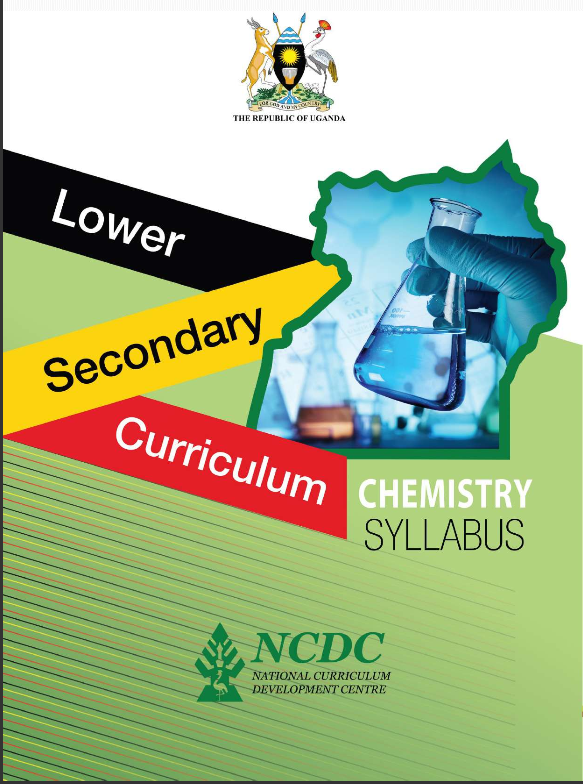
Chemistry New Lower Secondary Curriculum Syllabus
The application of scientific principles and the conduct of relevant research are of significant importance in identifying, assessing, and realising the potential of the resources of Uganda. A good foundation in the sciences will help citizens of Uganda to respond to the challenges of a rapidly changing world using the scientific approach. Chemistry is concerned with the physical and chemical properties of substances and the interaction of energy and matter. The study of Chemistry involves an investigation into chemical reactions and processes. The discipline seeks to explain and predict events at the atomic and molecular level.
Through the principles of Chemistry, learners will understand everyday life, nature and technology, and the significance of the wellbeing of man and the environment. The Ugandan Chemistry Syllabus is redesigned to allow learners to work individually and with others in practical, field, and interactive activities that are related to theoretical concepts in the course. It is expected that learners will apply investigative and problem-solving skills, effectively communicate scientific information, and appreciate the contribution the study of chemistry makes to their understanding of the world.
The syllabus places greater emphasis on the understanding and application of chemical concepts and principles and different learning styles and needs, so that learners will develop skills that will be of long- term value in an increasingly technological world, rather than focusing on large quantities of factual information. In addition, it encourages the use of various teaching and learning strategies while at the same time catering for multiple intelligences.
It contributes to the development of the ideal Ugandan citizen as articulated by the Education White Paper of 1992 in the following areas: respect for human life, awareness of the importance of living in harmony with the environment; demonstrates multiple literacies, independent and critical thinking and the innovative application of science and technology to problem solving. In keeping with the
UNESCO Pillars of Learning, on completion of this course of study, learners will learn to do, to be and transform themselves and society.
This syllabus aims to:
- appreciate and understand natural phenomena and the ways in which materials behave,
- be aware of the power, impact, and influence which Chemistry has in a modern scientific world and to emphasise that there is a responsibility that Chemistry be used for the good of the society and for the preservation of the environment,
- appreciate, understand, and use methods of science,
- see the relevance of Chemistry to everyday life,
- appreciate and understand the role of Chemistry in enabling materials to be used in the service of mankind, in Uganda and elsewhere,
- understand basic chemical concepts in sufficient depth to provide an adequate foundation for specialisation,
- develop the spirit of inquiry and to continue the search for new ways in which materials may be used in the service of mankind,
- appreciate the inter-relationships among Chemistry, Biology, Physics, Mathematics and other subjects,
- make use of chemical data, concepts, principles, and terminology in communicating chemical information,
- develop the ability to work independently and collaboratively with others when necessary,
- appreciate the significance and limitations of science in relation to social and economic development,
- integrate Information and Communication Technology (ICT) tools and skills into the teaching and learning of chemical concepts,
Teaching and Learning: Chemistry
The thrust of the new syllabuses is experiential and towards deeper understanding. The focus in Chemistry is on the development of understanding through scientific enquiry and rational thought.
The new syllabuses provide learners with a wide range of contexts in which to develop this understanding. These contexts are designed to engage the interest of the learner and to provide opportunities to build life-related knowledge, experience, and skills. Teachers are encouraged to go beyond the textbooks and provide as many meaningful contexts as possible. The generic skills have been integrated throughout the curriculum and can only be acquired through active approaches.
The role of the teacher is to build on learners’ existing knowledge and experience through posing problems to the learners. This makes them think about their own ideas and experiences as well as adding new knowledge and skills to it. Learners need to interact with real situations inside and outside the classroom. They need to look at pictures or diagrams, examine statistics, or read texts from a range of
sources. They need to find out knowledge and ideas for themselves. They should then be expected to express these in their own words, not those of the teacher, and so demonstrate that they have understood what they have learnt.
In this approach, learners are encouraged to:
- be responsible for their learning.
- think for themselves and form their ideas and opinions.
- become critical thinkers, ready to face new challenges and situations for themselves.
- baroque books new curriculum download pdf
- biology new curriculum notes
- Biology New Lower Secondary Curriculum Syllabus
- challenges of the new curriculum in uganda
- challenges of the new lower secondary curriculum in uganda
- chemistry
- chemistry syllabus
- difference between old curriculum and new curriculum in uganda
- disadvantages of the new curriculum in uganda
- features of the new lower secondary curriculum in uganda
- how to award marks in the new curriculum
- National Curriculum Development Centre
- ncdc art and design textbook pdf
- ncdc biology textbook pdf
- ncdc biology textbook pdf senior two
- ncdc download
- ncdc lower secondary curriculum
- ncdc mathematics textbook pdf
- ncdc new curriculum books pdf
- ncdc new curriculum syllabus books pdf
- ncdc physics textbook pdf download
- ncdc projects
- ncdc prototype books pdf
- ncdc publications
- ncdc senior one new curriculum
- ncdc senior one notes
- ncdc syllabus
- ncdc syllabus pdf
- ncdc textbooks download s2
- ncdc textbooks s2
- ncdc uganda
- new curriculum 2022
- new curriculum chemistry syllabus
- new curriculum for lower secondary
- new curriculum for secondary schools in uganda 2022
- new curriculum in uganda 2022 pdf
- new curriculum in uganda 2023
- new lower secondary curriculum
- new lower secondary curriculum in uganda pdf
- new lower secondary curriculum pdf
- new lower secondary curriculum syllabus
- new lower secondary curriculum syllabus books
- new lower secondary curriculum uganda
- new secondary school curriculum in uganda
- physics syllabus new curriculum
- s.2 biology notes new curriculum
- senior two biology topics
- subjects to be taught in the new curriculum
- What are the new subjects for the new curriculum
Recent Posts
- UNEB LITERATURE ENGLISH SAMPLE EXAM PAPER NEW LOWER SECONDARY CURRICULUM
- UNEB ENGLISH LANGUAGE SAMPLE EXAM PAPER NEW LOWER SECONDARY CURRICULUM
- UNEB GERMAN SAMPLE EXAM PAPER NEW LOWER SECONDARY CURRICULUM
- UNEB LATIN SAMPLE EXAM PAPER NEW LOWER SECONDARY CURRICULUM
- UNEB FRENCH SAMPLE EXAM PAPER NEW LOWER SECONDARY CURRICULUM




0 responses on "Chemistry New Lower Secondary Curriculum Syllabus"